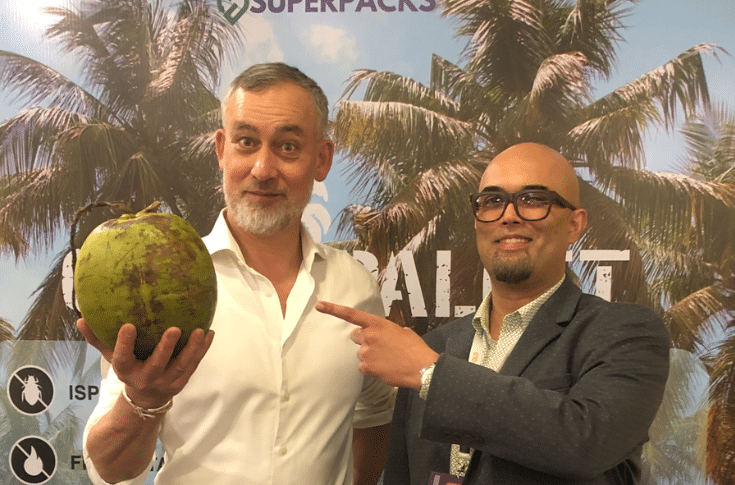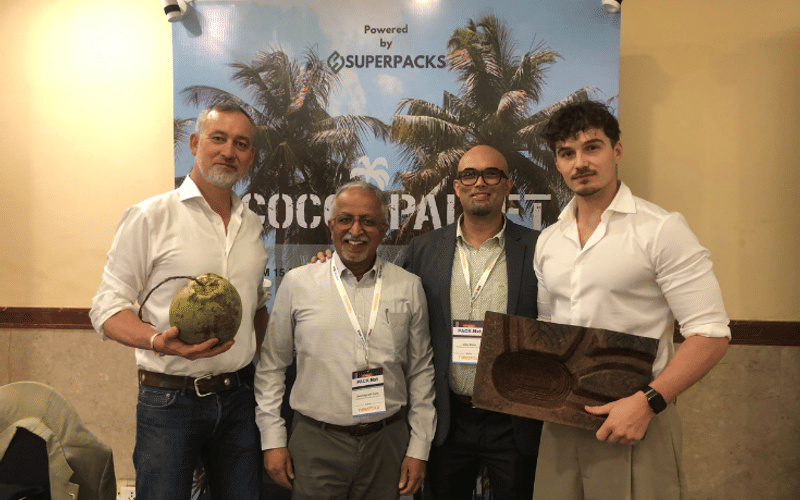Coconut husk pallets: Answer to single-use pallets
CocoPallet, a Netherlands-based company, is launching a fully sustainable, wood-free export pallet made from coconut husks, with its first global factory in Tiptur, India, in partnership with Superpacks. The initiative aims to scale production to 10 lakh pallets by 2028, reducing deforestation and offering an eco-friendly alternative to single-use wooden pallets, while also expanding to other regions like Tamil Nadu, Kerala, Indonesia, and the Philippines.
18 Feb 2025 | By Prabhat Prakash
A Netherlands-based company, CocoPallet is creating fully circular, bio-based, 100% wood free, ISPM15-compliant export pallets made from coconut husk. The company has partnered with India-based Superpacks and is setting up a plant in Tiptur, Karnataka.
Commercial operations will commence in July 2025. The factory will be able to manufacture 1.5-lakh pallets in 2025. The capacity will be increased to 10-lakh pallets (more than 4% of total husk supply in Tiptur) by 2028. The waste husk availability in Tiptur can produce 2.5-crore CocoPallets annually. The Indian market demand annually is approximately 5.7-crore pallets.
The Tiptur facility will be the first global factory of CocoPallet. The company aims to set up three-four regional facilities in Tamil Nadu and Kerala due to the abundance of coconut plantations in these regions. Other regions where CocoPallet intends to set up facilities is in Indonesia and the Philippines.
This is a solution that saves millions of trees while also recycling a waste product. As Prabhat Prakash finds out, it doesn’t get any better.The packaging industry has been working towards reducing its environmental impact with recyclable and sustainable packaging materials. The sector has been incorporating several new technologies and materials to improve consumer experience and reduce waste.
While interacting with WhatPackaging?, Michiel Vos, founder of CocoPallet, noted that the pallet design and technology have been borrowed from the wood industry. The manufacturing process of the pallet is similar to that of developing MDF particle boards, except without synthetic resin or binding agents. Vos shared, "The big difference is that we don't add synthetic resin like you do with MDF particle board because we use the lignin, which is already present in the material as a thermostat binder."
The production of the pallet happens in a mould where the shredded coconut husk is exposed to pressure and heat, which melts the naturally present lignin in the coconut husk. The lignin melts at the right temperature and pressure and, on cooling, acts as a binding agent.

South India has an abundance of coconut trees, making it a viable region to source raw materials for the production of coconut pallets. The partners have been sourcing raw materials from South Indian coconut growers at a fair price. Currently, the intention is to address the issue of single-use pallets made of wood and replace them with pallets made of coconut husk. Vos stated, "For one-way, don't use wood if possible. Use a CocoPallet or anything else that's more sustainable; this will lower the carbon footprint."
Vos also spoke about the product development process, which involved a lot of research and development and sourcing raw materials. He added that they have optimised the development process of the pallets and aim to be competitive in pricing to achieve a larger impact. He said, "We want to compete on price so we can scale it and have more impact. We're a for-profit impact company, so we need to scale up."
The test batches were developed in Germany at extremely high costs, as coconut husk was imported for the project and facilities were rented for the manufacturing process.
- Pallet Load Testing-ISO 8611 Standard
- Max Compression Load: 1250 kg (fork length) | -504 kg (fork width)
- Stacking Test: Max static load: 5120 kg (fork length) | 4380 kg (fork width)
- Deflection: 2.0 mm under load, 0.1 mm after relaxation
The prototypes were tested in supply chains across Asia, America, Brazil, and Australia. The product was well received in these regions, providing valuable learnings that helped improve the product and the development process.
Sharing his experience of doing business with Australia, Vos recalled that the nation is very strict when it comes to importing softwood and agricultural goods due to a massive termite problem. Softwood is a haven for termites as it is their favourite food. Coconut husk is naturally termite-proof. Therefore, CocoPallet doesn't need to be fumigated to eliminate termites, reducing costs and environmental impact.
The machine developed to mould the pallets uses German, Austrian, and Italian technology. Vos mentioned that importing the machine would incur high costs due to customs duty. Hence, building the machine in India would help reduce the company's capital expenditure and expedite the manufacturing process. The organisation is looking at Indian machine manufacturers and business partners to expand its business in India.
When asked if coconut husk quality is the same regardless of the region, Vos explained that coconuts, in general, are equal, but the age of the coconut is the deciding factor for choosing it to make pallets. The husk of ripe coconuts, around 11-12 months old, is used for the pallet manufacturing process. Vos also highlighted that the demand for coconuts has been plummeting in recent years, and farmers they interacted with are more than willing to sell them the husk as they were not getting any value for it. The husk was being used to make mats, ropes, fertiliser, and for burning purposes.
Vos also delved into the details of how the partnership with Superpacks came into existence. He mentioned that Superpacks was looking for alternatives to wooden pallets and came across CocoPallet’s work in the pallet space. Both partners have decided to set up a manufacturing plant in India.
Uday Bapu, managing partner and CEO of Superpacks, shared his side of the story on why they partnered with CocoPallet. He explained that his organisation has been in the packaging business for four decades, focussing on foam packaging, corrugated packaging, corrugated boxes, and ground boxes. Bapu mentioned that a few years ago, he was looking for sustainable packaging sources as many of his customers, large-scale MNCs, were being pressured by European nations and the United States (US) to become more sustainable and eliminate single-use packaging materials.
He explained that there are not enough commercial sustainable solutions on the market today, and even if they do exist, they are expensive. He added that CocoPallet will be the technology partner in India, while Superpacks will handle operations. Bapu stated, "CocoPallet is the technology provider, and we are the operations partner. We bring a lot of manufacturing expertise as we have five factories across India, so the boots are on the ground; the operational excellence will come from us."
Bapu explained how he intends to onboard some of his customers to use the coconut husk pallet as they export to the US, the UK, Europe, and Australia. Sharing how he is eyeing the pharma and FMCG markets in India, Bapu said, "For me, food and pharma would be a nice market to get into because they have certain stringent requirements, but the volumes are good." According to Bapu, for the production of 5.7-crore single-use pallets annually in the Indian market, approximately 82-lakh trees are felled.
When asked about how the pallet performs when exposed to natural elements like water, Bapu said that the density of the pallets is 1,000-kg per cubic metre, which makes the pallet dense and prevents water penetration. However, if the pallets need to be waterproof, they can be coated with beeswax or other commercial waterproofing materials.
Over time, the quality of coconut pallets will degrade, like all other materials, and they can be broken down into coco peat. Each pallet can generate about 18-kilogrammes of coco peat with a market value of USD seven to nine. When asked if any certifications were needed for the pallets, Vos and Bapu shared that the pallets are naturally pest and infestation-free, making it easier for them to do business.
The partners are also looking to raise funds to scale their business in India. According to CocoPallet and Superpacks, the product is as robust as other conventional products and is made from natural sources without artificial resins and binders, making the product sustainable and completely biodegradable.
Stat file
- 200 million trees are cut every year to manufacture single-use export wooden pallets
- Annual wooden pallet demand is 1.3 billion in Asia; most are burnt at the end of their lives
- 72 billion coconut husks are wasted
- 85% of coconut husks are burned or dumped in the landfill


